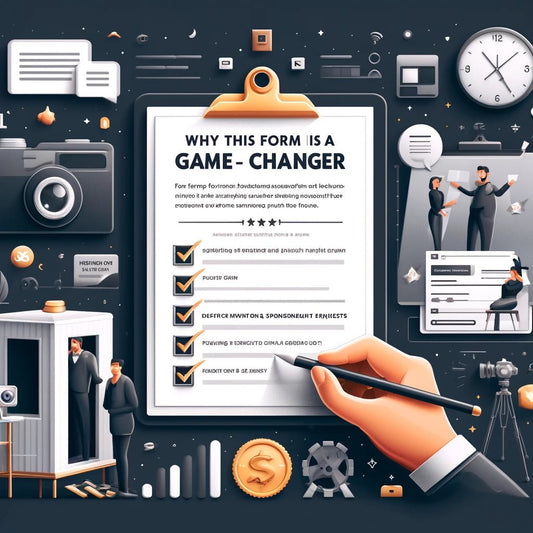
The Ultimate Guide to Corporate Event Management: Tips, Strategies, and Best Practices
Share
.jpg)
Corporate event management plays a crucial role in the success of businesses and organizations. It involves meticulously planning, coordinating, and executing various types of events to meet specific objectives and goals. Corporate event management is important for several reasons. It enhances brand image and reputation by creating memorable experiences for clients, employees, and stakeholders. It also helps in building and strengthening relationships with key partners, clients, and employees. Furthermore, corporate event management plays a vital role in driving business goals and objectives by creating opportunities for networking, promoting products or services, and showcasing expertise. The key components of corporate event management include event planning and strategy, event coordination and logistics, event marketing and promotion, and event execution and management. There are different types of corporate events such as conferences and seminars, product launches, gala dinners and award ceremonies, and team building activities. However, corporate event management also comes with its own set of challenges, including budget constraints, tight deadlines, managing stakeholder expectations, and ensuring attendee satisfaction. To overcome these challenges, best practices in corporate event management involve setting clear objectives and goals, effective communication and collaboration, thorough planning and organization, and attention to detail and flexibility. By implementing these strategies, businesses can maximize the benefits and impact of their corporate events.
Why is Corporate Event Management Important?
Corporate event management plays a crucial role in the success of businesses. It goes beyond just organizing events – it serves as a powerful tool for enhancing brand image, building and strengthening relationships, and driving business goals. From creating memorable experiences that leave a lasting impression to strategically aligning events with organizational objectives, corporate event management is the key to achieving meaningful results. Let's dive into the reasons why it is imperative in today's competitive business landscape.Enhancing Brand Image and Reputation
"Enhancing Brand Image and Reputation" has become a vital element of corporate event management. It is crucial to execute events proficiently as they have the potential to greatly influence how a company is perceived by its stakeholders and target audience. Here are several ways in which corporate events contribute to "enhancing brand image and reputation":
- Showcasing values: Corporate events provide an exceptional opportunity to align the brand with its core values. Attendees can experience and connect with the brand's mission and purpose firsthand.
- Creating positive experiences: Well-executed events leave a long-lasting impression on attendees, fostering positive associations with the brand and fostering brand loyalty.
- Building industry credibility: By hosting industry-specific conferences or seminars, the brand positions itself as a thought leader, thus enhancing its reputation and establishing credibility within the industry.
- Engaging with influencers: By extending invitations to influencers, the brand can increase brand visibility and credibility. Influencers hold the power to endorse the brand to their dedicated followers.
- Gaining media coverage: Events that are well-publicized tend to attract media attention, resulting in positive media coverage. This coverage can significantly elevate the brand's reputation and help reach a wider audience.
Building and Strengthening Relationships
Building and strengthening relationships is a crucial aspect of corporate event management. By fostering connections and creating a positive atmosphere, businesses can enhance collaboration and trust among stakeholders. Here are some ways to achieve this goal:
- Networking opportunities: Provide structured networking sessions or informal settings where attendees can interact and establish connections.
- Engage through activities: Incorporate team-building exercises or ice-breaker activities that encourage participants to work together and form bonds.
- Personalized interactions: Ensure personalized experiences for attendees through thoughtful gestures, such as personalized welcome messages or customized gifts.
- Facilitate collaboration: Create spaces for collaboration, such as breakout sessions or group activities, where individuals can exchange ideas and foster partnerships.
In 2019, a corporate event brought together industry leaders for a three-day conference. Through team-building activities and networking opportunities, professionals from different companies formed valuable connections. This led to collaborations on future projects, increased business partnerships, and a stronger network within the industry. The event's focus on building and strengthening relationships proved to be a catalyst for long-term success.
Driving Business Goals and Objectives
Driving business goals and objectives is a crucial aspect of corporate event management. By strategically planning and executing events, companies can achieve various business objectives and drive growth. Here are some effective strategies to drive business goals and objectives through corporate events:
- Networking Opportunities: Create a conducive environment for attendees to network and forge new business connections.
- Product Launches: Use events to introduce new products or services to potential clients and generate buzz around them.
- Lead Generation: Design events that capture leads and provide valuable data for sales and marketing purposes.
- Brand Awareness: Organize events that promote brand visibility and reinforce the company's value proposition.
- Industry Expertise: Position your company as a thought leader by hosting industry-specific conferences or seminars.
Pro-tip: Align your event goals with your overall business strategy to ensure maximum impact and long-term success.
Key Components of Corporate Event Management
Planning and executing a successful corporate event involves several key components. In this section, we will uncover the essential elements that make up effective corporate event management. From strategic event planning to seamless coordination and logistics, from effective marketing and promotion to flawlessly executing and managing the event, we will dive into each sub-section to understand how they contribute to the overall success of corporate events. Get ready to discover the secrets behind hosting memorable and impactful corporate gatherings.Event Planning and Strategy
Event planning and strategy are crucial aspects of effective corporate event management. A well-considered and strategic approach can guarantee a seamless and impactful event experience. Key components to take into account in event planning and strategy include:
|
By focusing on event planning and strategy, corporate event managers can maximize the success of their events while also creating memorable experiences for attendees.
Event Coordination and Logistics
- Event Coordination and Logistics
- Event Coordination and Logistics
- Event Coordination and Logistics
- Event Coordination and Logistics
Incorporating effective event coordination and logistics is crucial for successful corporate event management. To ensure a seamless execution, it is important to consider the following:
- Venue selection: Choose a venue that aligns with the event goals and accommodates the number of attendees. Consider factors such as location, accessibility, and facilities.
- Supplier management: Collaborate with reliable suppliers for catering, audiovisual equipment, and transportation. Clearly communicate expectations and coordinate logistics to avoid any last-minute issues.
- Timeline creation: Develop a detailed timeline outlining all event activities, including setup, registration, sessions, and breaks. It helps to keep the event on schedule and ensures a smooth flow.
- Guest management: Efficiently handle attendee registrations, check-ins, and any special requirements. Prioritize attendee satisfaction and make sure they have a positive experience.
Incorporating effective event coordination and logistics plays a vital role in creating memorable and impactful corporate events. Paying attention to detail, maintaining clear communication, and working with trusted partners are key to successful execution.
Event Marketing and Promotion
Event marketing and promotion are essential elements of corporate event management. These strategies play a vital role in creating awareness, generating interest, and attracting attendees to the event. To ensure success, it is important to identify the target audience and tailor the marketing message accordingly. This will help resonate with their needs and interests while getting the word out about the event. Leverage the power of online platforms like social media, email marketing, and website promotion to reach a larger audience and engage with potential attendees effectively. Content marketing is another valuable tool in event promotion. By creating compelling blog posts, videos, and infographics, you can showcase the event's value and highlight its key attractions. Additionally, collaborating with industry influencers or thought leaders can greatly boost the event's credibility and visibility. Offering promotional incentives such as early bird discounts, referral rewards, or exclusive perks can be highly effective in encouraging registrations and boosting attendee numbers. It is also crucial to ensure the event is listed on popular event listing websites to maximize its visibility and attract a broader audience.Event Execution and Management
Event execution and management are indispensable elements of prosperous corporate event management.
- Well-organized execution: Coordinate all event logistics including venue setup, audiovisual equipment, and catering to ensure a smooth and seamless experience for attendees.
- Efficient event management: Oversee the event timeline, manage event staff, and handle any unexpected issues that may arise.
- Attention to detail: Pay meticulous attention to every aspect of the event, from registration and ticketing to onsite signage and branding, to ensure a high-quality experience.
- Effective communication: Maintain clear and constant communication with all stakeholders, including vendors, sponsors, and attendees, to ensure everyone is informed and aligned.
Historically, event execution and management have played a pivotal role in the success of corporate events. From ancient civilizations hosting grand celebrations to modern-day conferences and product launches, meticulous planning and flawless execution have always been pivotal to creating memorable and impactful events.
Types of Corporate Events
Discover the variety of corporate events that can bring businesses together and leave a lasting impact! From power-packed conferences and seminars to dazzling product launches, glamorous gala dinners, and thrilling team building activities, there's an event for every objective. Get ready to delve into the exciting world of corporate event management and explore the endless possibilities that await. Let's dive into each sub-section and unveil the wonders that they hold. It's time to make your corporate event dreams a reality!Conferences and Seminars
Conferences and seminars are vital elements in the field of corporate event management. They hold immense importance as they provide significant opportunities for sharing knowledge, networking, and fostering skill development. When it comes to organizing conferences and seminars, there are several key points that should be taken into consideration:
- First and foremost, it is crucial to define clear objectives and identify the target audience to ensure that the content presented is relevant and meaningful.
- It is important to carefully choose suitable venues and utilize appropriate technology to accommodate the attendees effectively and facilitate seamless presentations.
- Another essential aspect is to curate a diverse range of speakers who can offer different perspectives and showcase their expertise in the respective subject matter.
- To keep the participants engaged and interested, it is imperative to create interactive sessions through activities, panel discussions, and opportunities for Q&A.
- Furthermore, offering learning materials and resources post-event can greatly contribute to enhancing the overall experience of the participants.
When organizing conferences and seminars, incorporating all of these key points will undoubtedly lead to successful and impactful events.
Product Launches
- Product launches are crucial for the success of a company. They provide an opportunity to introduce new products to the market and generate excitement among consumers.
- When planning a product launch, it is important to consider the target audience. Identifying the specific target market for the product and tailoring the launch event to their preferences and interests is key.
- Choosing a venue that aligns with the brand image and can accommodate the desired number of attendees is another important consideration in a product launch.
- Creating a theme that resonates with the product and reflects the brand identity is essential for a successful product launch.
- The messaging and storytelling around the product should be crafted carefully. It should highlight the unique features and benefits of the product to captivate the audience.
- Developing a media strategy is crucial to generate press coverage and create buzz around the product during its launch.
Gala Dinners and Award Ceremonies
- Gala Dinners: Gala dinners are formal events that often involve a sit-down meal and entertainment. Gala dinners are usually organized to celebrate achievements, milestones, or to raise funds for a charitable cause. These events follow a specific dress code and may include speeches, presentations, and performances.
- Award Ceremonies: Award ceremonies are special occasions where individuals or organizations are recognized and honored for their remarkable accomplishments. Award ceremonies can vary in scale, from smaller internal ceremonies to large industry-wide events. Such ceremonies typically feature the presentation of awards, speeches given by winners or notable figures, and occasionally entertainment.
Team Building Activities
Team building activities, such as ropes courses, obstacle courses, or scavenger hunts, are an integral part of corporate event management. These activities are crucial in fostering collaboration, improving communication, and boosting team morale. There are several popular team building activities that you can consider:
| No. | Name | Description |
|---|---|---|
| 1 | Outdoor Challenges | Engage teams in physical activities like ropes courses, obstacle courses, or scavenger hunts to promote teamwork and problem-solving skills while participating in team building activities. |
| 2 | Leadership Workshops | Conduct workshops specifically designed to develop leadership skills, enhance decision-making abilities, and encourage effective teamwork during team building activities. |
| 3 | Creative Workshops | Organize art or music workshops to encourage creativity, inspire innovative thinking, and strengthen team bonds through team building activities. |
| 4 | Sports Tournaments | Arrange friendly sports competitions to promote team spirit, encourage healthy competition, and improve teamwork as part of team building activities. |
| 5 | Volunteer Activities | Engage teams in community service projects to foster a sense of giving back and strengthen team relationships while participating in team building activities. |
Pro-tip: Customize team building activities based on the preferences and interests of your team members to ensure maximum participation and enjoyment during team building activities.
Challenges Faced in Corporate Event Management
Corporate event management can be a rollercoaster ride, filled with challenges that push professionals to their limits. From tight deadlines to budget constraints, managing stakeholder expectations to ensuring attendee satisfaction, this section delves into the real struggles faced by event organizers. We'll uncover the trials and tribulations that come with juggling multiple demands, and explore how these hurdles can be overcome with strategic planning and a dash of creativity. So fasten your seat belts, and get ready to dive into the exhilarating world of corporate event management.Budget Constraints
When faced with budget constraints in corporate event management, it is crucial to carefully plan and prioritize to ensure a successful event. Here are some strategies to consider when working with limited resources:
- Establish clear budget parameters and adhere to them throughout the planning process.
- Explore cost-saving options such as negotiating with vendors for discounts or seeking sponsorships.
- Giving priority to essential elements of the event and allocating funds accordingly.
- Take into account alternative venues or dates that may offer cost advantages.
- Harness technology and digital tools to reduce expenses, like virtual event platforms or electronic ticketing systems.
By implementing these practices, event managers can effectively navigate budget constraints while still delivering a memorable and impactful corporate event.
Tight Deadlines
When handling tight deadlines in corporate event management, it is imperative to stay organized and prioritize tasks efficiently. Here are some steps to help you navigate through the pressure:
- Assess the timeline: Clearly understand the project's timeline and identify the key milestones.
- Create a detailed timeline: Break down the tasks into smaller, manageable steps and set deadlines for each.
- Delegate tasks: Assign responsibilities to team members based on their skills and expertise.
- Prioritize tasks: Determine which tasks are critical and tackle them first to avoid any delays.
- Regular communication: Maintain open and frequent communication with all stakeholders to ensure everyone is on the same page and progress is being made.
- Flexibility and adaptability: Be prepared for unexpected changes and have contingency plans in place.
- Time management: Use time management techniques such as setting specific time blocks for each task and eliminating distractions.
Remember, although tight deadlines can be challenging, effective planning, communication, and proper time management can help you meet your goals successfully. Keep calm and focused!
Managing Stakeholder Expectations
Managing Stakeholder Expectations is a vital component of corporate event management. This entails comprehending the needs and demands of stakeholders, including clients, sponsors, attendees, and employees, and ensuring that their expectations are not only met but also surpassed. Effective communication is essential for effectively managing these expectations, as it enables clear and transparent discussions concerning event objectives, timelines, budgets, and deliverables. By addressing and aligning stakeholder expectations at an early stage in the planning process, event managers can cultivate stronger relationships, promote trust and collaboration, and ultimately organize prosperous and influential corporate events.
Ensuring Attendee Satisfaction
Ensuring Attendee Satisfaction is crucial in corporate event management for maintaining positive experiences and fostering long-term relationships. Achieving this involves attention to detail, communication, and creating an engaging and enjoyable environment.
- Pre-event communication: Providing clear and timely information about the event schedule, location, and any special requirements helps attendees plan and feel prepared.
- On-site experience: Ensuring Attendee Satisfaction by ensuring smooth check-in, comfortable seating, and well-organized sessions contribute to a positive overall experience.
- Catering and hospitality: Serving delicious meals and refreshments, accommodating dietary restrictions, and offering exceptional hospitality creates a memorable experience.
- Engaging activities: Incorporating interactive elements, networking opportunities, and educational sessions keeps attendees engaged and satisfied.
- Post-event follow-up: Sending thank-you messages, requesting feedback, and addressing any concerns demonstrate a commitment to Ensuring Attendee Satisfaction even after the event.
During the 1893 World's Fair in Chicago, event organizer George Ferris invented the Ferris wheel to ensure attendee satisfaction and offer a unique and thrilling experience. The Ferris wheel quickly became an iconic attraction at events worldwide, exemplifying the importance of Ensuring Attendee Satisfaction in event management.
Best Practices in Corporate Event Management
Implementing best practices in corporate event management can lead to successful and memorable events that meet organizational objectives and promote the company's mission and vision. Here are some key practices to consider:
|
Frequently Asked Questions
What is corporate event management?
Corporate event management involves overseeing the organization and execution of various business-related events such as conferences, seminars, product launches, corporate galas, trade shows, and exhibitions.
Why are corporate events important?
Corporate events are important for networking, showcasing products or services, raising brand awareness, and rewarding employees.
What are the different types of corporate events?
Different types of corporate events include conferences and seminars, product launches, corporate galas and dinners, trade shows and exhibitions, team building events, and charity events.
What are the key steps involved in organizing a corporate event?
The steps involved in organizing a corporate event include pre-event planning, event execution, and post-event evaluation.
What are some key skills needed for success in corporate event management?
Key skills needed for success in corporate event management include organization, communication, problem-solving, attention to detail, and creativity.
Which are some of the top corporate event management companies?
Some of the top corporate event management companies include TravelPerk, MKG, Event Solutions, Cvent, BCD Meetings & Events, Banks Sadler, Grass Roots Meetings & Events, and The Appointment.






